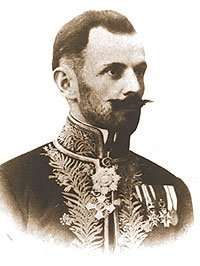Boško Čolak-Antić
Boško I. Čolak-Antić (Serbian Cyrillic: Бошко Чолак-Антић; 21 August 1871 – 24 March 1949) was a Serbian lawyer, diplomat, and Marshal of the Court of the Kingdom of Serbia and Kingdom of Yugoslavia.[1]
Boško Čolak-Antić | |
|---|---|
Бошко Чолак-Антић | |
 Boško I. Čolak-Antić c. 1903 | |
| Personal details | |
| Born | 21 August 1871 Kragujevac, principality of Serbia |
| Died | March 24, 1949 (aged 77) Belgrade, Yugoslavia |
| Nationality | Serbian |
| Father | Ilya Čolak-Antić |
| Alma mater | University of Geneva (PhD, 1894) |
| Occupation | Diplomat |
Early life and career
Boško Čolak-Antić was born in Kragujevac, Principality of Serbia into an influential Serbian family with a long military tradition; the first son of Colonel Ilya Čolak-Antić commander of the Ibar Army during the Serbo-Turkish war, and Jelena (née Matić). Čolak-Antić's maternal grandfather was prominent Liberal politician and philosopher Dimitrije Matić who was President of the National Assembly when Serbia gained independence. He had a younger brother Vojislav (1877). Čolak-Antić was the great-grandson of Vojvoda Čolak-Anta Simeonović, one of the leaders of the First Serbian Uprising of 1804. After graduating from secondary school, he went to study law at the University of Geneva, where, in 1894, he became doctor of law.[2] He returned to Serbia and began his career at the Ministry of Finance before transferring to the Ministry of Foreign Affairs in 1898.[3]
Diplomatic service
His diplomatic career started in 1899 when Čolak-Antić was appointed Secretary of the Serbian Representation in Sofia then Minister Plenipotentiary to the Principality of Bulgaria at a time of turmoil in neighbouring Turkish provinces; he expressed concerned about the secret talks happening between the Bulgarians and the Ottomans regarding the unrest in the region of Macedonia, bypassing the three other members representing the different communities Serbian, Greek and Vlach. His mission ended in 1903. After the change of dynasty and the coronation of Peter I of Serbia, on 21 September 1904, Čolak-Antić became acting Marshal of the Royal Court of Serbia, a position he will occupy until 1907 while still executing diplomatic missions around Europe.[4]
His next appointment was in Cairo where he served as ambassador from 1908 until 1912, in Egypt he started a lifelong friendship with French Egyptologist Gaston Maspero, who served as director of the Egyptian Museum in Cairo, Maspero mentioned Čolak-Antić multiple times in his memoirs. He was deputy and ambassador in many European capitals, most notably in Sofia, Kingdom of Bulgaria, starting in the period preceding the First World War until the invasion of Serbia by the Central Powers in November 1915.[5] In a telegram dated 1 July 1914, Čolak-Antić warned Prime Minister Nikola Pašić that through a loan offered by the German Empire, the Bulgarian government was bound to the camp of the Triple Alliance.[6]
In October 1915 when Serbia was attacked and invaded by the combined armies of Germany, Austria-Hungary and Bulgaria, Čolak-Antić returned home to volunteer and took part in the retreat through Albania to Corfu where he joins the Serbian Government. He relocates to Salonika with the rest of the army and where his brother Vojin, now Colonel, is commander of the 3rd Serbian Cavalry Brigade.[7] After the war and the ensuing reshuffle he became Ambassador of the new Kingdom of Yugoslavia in Sweden, taking residence in Stockholm on 18 February 1918 staying until 1920.[3] On 3 March 1920 Čolak-Antić was envoy extraordinary then ambassador to Romania, he is based in Bucharest where he represented the kingdom in the talks of the Little Entente with Czechoslovakia and Romania in order to build a common defense against Hungary.
In 1935 he goes back to Yugoslavia after being appointed Marshal of the Royal Court, he remained in that capacity until 1941.[8]
References
Citations
- Foreign Office 2008, p. 1224.
- Ljubinka Trgovčević 2003.
- Robert L. Jarman 1997, p. 668.
- Robert L. Jarman 1997, p. 129.
- Andrej Mitrović 2007, p. 187.
- F.H. Hinsley & Keith Wilson 2016, p. 87.
- Auguste Boppe 1916, p. 764.
- Branislav Gligorijević 2002, p. 7.
Sources
- Robert L. Jarman (1997). Yugoslavia: 1927-1937. Archive Editions Limited. ISBN 978-1-85207-950-5.CS1 maint: ref=harv (link)
- Andrej Mitrović (2007). Serbia's Great War, 1914-1918. Purdue University Press. ISBN 978-1-55753-477-4.CS1 maint: ref=harv (link)
- F.H. Hinsley; Keith Wilson (2016). Decisions For War, 1914. Routledge. ISBN 978-1-134-21310-8.CS1 maint: ref=harv (link)
- Branislav Gligorijević (2002). King Alexander Karađorđević: In European politics (in Serbian). Institute for textbooks and teaching material.CS1 maint: ref=harv (link)
- Foreign Office (2008). Documents on the foreign policy of the Kingdom of Serbia (in Serbian). 2. Serbian Academy of Sciences and Arts.CS1 maint: ref=harv (link)
- Čedomir Popov; Dragoljub Živojinović (2013). Two Centuries of Modern Serbian Diplomacy (in Serbian). Balkan Institute SANU. ISBN 978-86-7179-079-6.CS1 maint: ref=harv (link)
- Ljubinka Trgovčević (2003). Students from Serbia in European universities in the 19th century (in Serbian). Historical Institute.CS1 maint: ref=harv (link)
- Auguste Boppe (1916). A La Suite Du Gouvernement Serbe: De Nich A Saint-jean De Medua 20 Octobre 1915 — 14 Février 1916 (in French). Revue des Deux Mondes. ISBN 978-1-85207-950-5.CS1 maint: ref=harv (link)